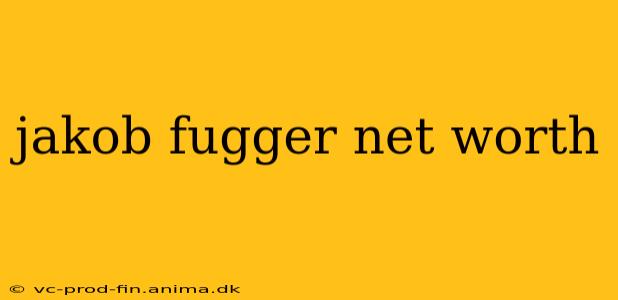Jakob Fugger the Rich (Jakob Fugger der Reiche, 1459-1525) remains one of history's most fascinating and influential figures. His name is synonymous with immense wealth, shrewd business acumen, and a pivotal role in shaping the economic and political landscape of the Renaissance. While pinning down his exact net worth in modern terms is an impossible task due to the complexities of 16th-century economics, exploring his business empire and its impact gives a compelling picture of his staggering fortune. This exploration delves into the life and legacy of this remarkable man, examining his wealth, influence, and lasting contribution to the world of finance.
How Much Was Jakob Fugger's Net Worth?
Determining Jakob Fugger's net worth in modern-day currency is inherently challenging. The economic systems, monetary values, and global trade dynamics of the 16th century differ drastically from those of today. Historians and economists have attempted estimations, but these figures should be viewed as approximations, not definitive answers. Some estimates place his wealth at the equivalent of billions of dollars in today's money, reflecting the sheer scale of his operations and the value of his assets. However, it's crucial to understand that such figures are interpretations based on complex calculations and estimations of the value of commodities, land, and investments in a vastly different economic context.
What Made Jakob Fugger So Rich?
Jakob Fugger's extraordinary wealth stemmed from his keen business sense, his entrepreneurial spirit, and his strategic diversification across numerous lucrative sectors. His success wasn't based on luck but on a meticulously planned and executed business strategy.
Early Beginnings and the Augsburg Banking Dynasty:
He built upon the foundation laid by his family, starting with his father, Johann Fugger, who established the Fugger family's textile trading business. Jakob, however, took it to unprecedented levels. His empire was built on:
-
Mining and Metallurgy: The Fuggers' control over the Tyrol silver mines proved incredibly profitable, providing them with vast wealth and a steady stream of income. Jakob significantly expanded this operation, becoming one of the largest producers of silver in Europe. This silver fueled the growth of his banking empire and enabled him to offer loans to powerful rulers.
-
Banking and Finance: Jakob Fugger revolutionized banking practices. He offered loans and financial services to powerful European monarchs and rulers, using his vast resources to influence political events. This power was immense and shaped the balance of power in Europe.
-
Trade and Commerce: He maintained a vast network of trade routes throughout Europe, facilitating commerce and diversifying his assets across multiple industries.
Strategic Partnerships and Political Influence:
Fugger's success wasn't solely based on business acumen. His strategic alliances with powerful individuals, notably the Habsburg emperors, gave him political influence and access to lucrative contracts and monopolies. He leveraged his financial power to secure favorable terms and expand his business empire.
What Did Jakob Fugger Invest In?
Jakob Fugger's investments spanned various sectors, showcasing his understanding of diversification and risk management:
- Mining (Silver and Copper): This formed the cornerstone of his fortune. The Tyrol silver mines fueled his banking empire and provided immense wealth.
- Textiles: The family's original business, this sector remained a significant part of his investments.
- Real Estate: Fugger invested heavily in land and property in various European cities, securing a substantial and stable asset base.
- Loans to Royalty and Nobility: His most significant investments were in loans to powerful figures, securing his position as a major player in European politics. This allowed him to influence policy and secure monopolistic access to certain sectors.
How Did Jakob Fugger Spend His Money?
Beyond amassing wealth, Fugger was known for his philanthropy and patronage of the arts and sciences. He funded numerous religious and charitable works. However, a significant portion of his wealth was reinvested to expand his already substantial empire.
Was Jakob Fugger a Good Man?
Whether Jakob Fugger was "good" is a complex question. He used his wealth and influence to achieve his goals, often engaging in practices that would be considered ethically questionable by today's standards. He employed ruthless business tactics when necessary and manipulated political situations to benefit his interests. Yet, he also displayed significant generosity through his philanthropic activities. Assessing his morality requires considering the historical context and the complexities of his dealings within the societal norms of the time. His legacy is multifaceted, a blend of ambition, shrewdness, and philanthropy.
This exploration of Jakob Fugger's life and wealth offers a glimpse into the complexities of his financial empire and its lasting impact on history. While the precise quantification of his net worth remains elusive, his influence on Renaissance Europe is undeniable. His story serves as a testament to the power of entrepreneurial spirit, strategic alliances, and a keen understanding of both finance and politics.
